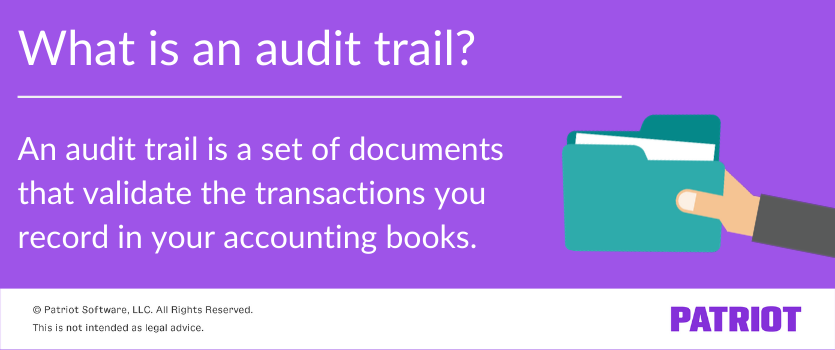As a business owner, you’re responsible for recording your company’s transactions. And to support your entries, you should be keeping adequate documentation. This accounting documentation acts as an audit trail for your business. Read on to learn what is an audit trail and why it is essential for your small business.
What is an audit trail in accounting?
An audit trail is a set of documents that validate the transactions you record in your accounting books. Your trail helps track and verify an accounting transaction to its source. When you record transactions in your books, you base the entries on your business’s transactions and events. Events can include things like purchases, sales, and expenses.
Each record in an audit trail includes information about what the event was, who created the event, and the day/time the event happened.
Depending on the transaction, documentation to support the activity may involve one document or a series of documents. A few examples of documents you need to hold on to include:
- Purchase orders
- Business invoices
- Written estimates
- Correspondence from transactions (e.g., emails)
Many businesses use audit trails to verify whether or not an accounting entry is accurate. Industries that commonly use audit trails include health, financial, accounting, and IT industries.

Example of audit trail
Let’s say your bakery needs to purchase a new delivery vehicle. You might request a purchase order authorizing the type of vehicle as well as the price range. If your business doesn’t have a purchase order system, you may get a written estimate from the car dealership.
Once the bakery purchases the vehicle, the auto dealership gives you a bill of sale that shows things like the vehicle type, purchase amount, and terms of the purchase.
The documents you receive during your vehicle purchase become part of the vehicle’s audit trail. Record the purchase in your business books and keep the documentation in your records.
Importance of having an audit trail
Having a complete audit trail proves to individuals, like auditors or investors, that the information in your books is valid. Not to mention, establishing an audit trail keeps your business compliant with the IRS’s standards of recordkeeping.
You can also use your audit trail to help with reconciling accounts, planning your business budget, and managing risks.
It’s no secret that there are a number of perks to having an accounting audit trail. Take a look at five ways an audit trail can benefit your business.
1. Prevents fraud
One main purpose of an audit trail is to help detect and prevent fraud. When you have a trail of documents that validate an accounting transaction, you can prove that your transactions are valid.
In addition to proving the validity of a transaction, having an audit trail in place for all business activity helps minimize the risk of fraud. With stricter requirements, employees will know that you monitor and track their work for fraudulent activity and realize that fraud won’t go unnoticed.
2. Helps auditors
Having an audit trail not only helps you track down transactions, but also lets auditors and other personnel find and verify activities. Audit trails make the audit process quicker and easier for everyone involved. And, they make preparing for an audit less stressful.
For example, an auditor might see an unusual transaction in your books and question its accuracy. With an audit trail, auditors can look at supporting documentation (e.g., invoice) to determine whether or not the transaction is valid.
3. Enhances accuracy
If you want to enhance your financial record’s accuracy, having an audit trail is a good way to go. Audit trails help ensure your financial reports and records contain accurate information. If your records are incorrect, business owners, investors, and lenders will not have accurate financial information to make sound decisions.
To give yourself a clear snapshot of your business’s finances and ensure your books are accurate, keep track of your transactions using an audit trail.
4. Finds lost transactions
If you’re having trouble finding a certain transaction in your books, an audit trail can help you out.
Say you know nothing about a transaction except for the day it happened. You can use your audit trail to track down the transaction and find out other key information about it (e.g., purchase amount).
Even if you don’t lose track of any transactions, having an audit trail in place can give you the peace of mind knowing that you can trace a transaction when necessary.
5. Helps with disaster recovery
If a disaster strikes your business (e.g., flood), you have to be prepared. Audit trails give you the opportunity to piece together damaged or missing information if a disaster occurs. An audit trail can help you recreate your business’s transactions for the period.
To make sure your audit trail stays intact if a disaster does occur, be sure to back up all of your records. You may consider keeping both paper and electronic copies of your documentation in the cloud. That way, your audit trail won’t be completely destroyed during a disaster.
Paperless audit trails
Some businesses might store paper copies of their transaction audit trail, while others might opt for a paperless system. If you decide to go the paperless route, you can avoid finding a place to store your paper accounting records. Not to mention, you don’t have to worry about spending additional money on storage supplies (e.g., cabinets and folders).
On the other hand, you have to also be cautious when using a paperless filing system for your audit trail. When saving documents electronically, label them accordingly. To stay organized and avoid losing track of any files, consistently label your files and keep them in chronological order.
Whether you store audit trail documents in a filing cabinet or electronically, you need to keep your records organized. That way, you can locate and view documentation from an accounting transaction at a moment’s notice.
Searching for an easy way to track your business transactions? Patriot’s accounting software makes it a breeze to record your income and expenses. Start a free trial today!
Have questions, comments, or concerns about this post? Like us on Facebook, and let’s get talking!
This article has been updated from its original publication date of March 2, 2015.
This is not intended as legal advice; for more information, please click here.



